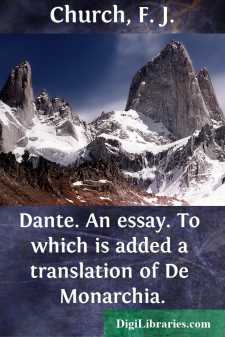Categories
- Antiques & Collectibles 13
- Architecture 36
- Art 48
- Bibles 22
- Biography & Autobiography 813
- Body, Mind & Spirit 142
- Business & Economics 28
- Children's Books 15
- Children's Fiction 12
- Computers 4
- Cooking 94
- Crafts & Hobbies 4
- Drama 346
- Education 46
- Family & Relationships 57
- Fiction 11829
- Games 19
- Gardening 17
- Health & Fitness 34
- History 1377
- House & Home 1
- Humor 147
- Juvenile Fiction 1873
- Juvenile Nonfiction 202
- Language Arts & Disciplines 88
- Law 16
- Literary Collections 686
- Literary Criticism 179
- Mathematics 13
- Medical 41
- Music 40
- Nature 179
- Non-Classifiable 1768
- Performing Arts 7
- Periodicals 1453
- Philosophy 64
- Photography 2
- Poetry 896
- Political Science 203
- Psychology 42
- Reference 154
- Religion 513
- Science 126
- Self-Help 84
- Social Science 81
- Sports & Recreation 34
- Study Aids 3
- Technology & Engineering 59
- Transportation 23
- Travel 463
- True Crime 29
Dante. An essay. To which is added a translation of De Monarchia.
by: F. J. Church
Description:
Excerpt
DANTE.
[Jan. 1850.]
The Divina Commedia is one of the landmarks of history. More than a magnificent poem, more than the beginning of a language and the opening of a national literature, more than the inspirer of art, and the glory of a great people, it is one of those rare and solemn monuments of the mind's power, which measure and test what it can reach to, which rise up ineffaceably and for ever as time goes on, marking out its advance by grander divisions than its centuries, and adopted as epochs by the consent of all who come after. It stands with the Iliad and Shakspere's Plays, with the writings of Aristotle and Plato, with the Novum Organon and the Principia, with Justinian's Code, with the Parthenon and S. Peter's. It is the first Christian poem; and it opens European literature, as the Iliad did that of Greece and Rome. And, like the Iliad, it has never become out of date; it accompanies in undiminished freshness the literature which it began.
We approach the history of such works, in which genius seems to have pushed its achievements to a new limit, with a kind of awe. The beginnings of all things, their bursting out from nothing, and gradual evolution into substance and shape, cast on the mind a solemn influence. They come too near the fount of being to be followed up without our feeling the shadows which surround it. We cannot but fear, cannot but feel ourselves cut off from this visible and familiar world—as we enter into the cloud. And as with the processes of nature, so it is with those offsprings of man's mind, by which he has added permanently one more great feature to the world, and created a new power which is to act on mankind to the end. The mystery of the inventive and creative faculty, the subtle and incalculable combinations by which it was led to its work, and carried through it, are out of the reach of investigating thought. Often the idea recurs of the precariousness of the result; by how little the world might have lost one of its ornaments—by one sharp pang, or one chance meeting, or any other among the countless accidents among which man runs his course. And then the solemn recollection supervenes, that powers were formed, and life preserved, and circumstances arranged, and actions controlled, that thus it should be: and the work which man has brooded over, and at last created, is the foster-child too of that "Wisdom which reaches from end to end, strongly and sweetly disposing all things."
It does not abate these feelings, that we can follow in some cases and to a certain extent, the progress of a work. Indeed, the sight of the particular accidents among which it was developed—which belong perhaps to a heterogeneous and widely discordant order of things, which are out of proportion and out of harmony with it, which do not explain it, which have, as it may seem to us, no natural right to be connected with it, to bear on its character, or contribute to its accomplishment, to which we feel, as it were, ashamed to owe what we can least spare, yet on which its forming mind and purpose were dependent, and with which they had to conspire—affects the imagination even more than cases where we see nothing....


